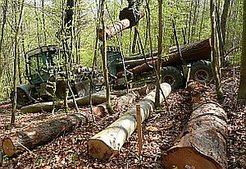The Use of Biomass Halves the Amount of Carbon Stored by Plants
According to a recent study in the scientific journal “Nature,” plants in terrestrial ecosystems store approximately 450 billion tons of carbon worldwide – less than half of the amount theoretically possible. This is due to the use of biomass by humans. Surprisingly, forestry and agriculture in natural forests and grasslands have a similarly pronounced effect in this regard as the cutting down forests for farmland. Scientists at Senckenberg, Klagenfurt University, and the Max Planck Institutes of Biogeochemistry and Meteorology caution that the increased use of biomass envisaged by the climate policy may therefore not always be climate-neutral.

Press Release of the Senckenberg Biodiversity and Climate Research Centre
Plants store carbon, which makes them an important climate factor. The effects of deforestation for farmland on the earth’s carbon balance are rather well quantified. The effects of other land use practices, however, have only been poorly studied to date. For the first time, scientists have now calculated a comprehensive set of land uses affects the amount of carbon stored by plants.
According to their analysis, plants in terrestrial ecosystems currently store about 450 billion tons of carbon worldwide – significantly less than potentially possible. “In a hypothetical world without land use, the vegetation would store twice as much carbon,” explains Dr. Thomas Kastner of the Senckenberg Biodiversity and Climate Research Centre, one of the participants in the study.
Roughly half of the difference between the potentially and actually stored carbon volume results from the deforestation and other changes in land cover (53-58 %), while the other half is due to the effects of forestry and the grazing of natural grasslands (42-47 %), two thirds of which can be attributed to forestry.
According to the study’s leading author, Professor Karl-Heinz Erb of Klagenfurt University, “The effects of forestry and pasture farming on the volume of carbon stored by plants are drastically underestimated. Managed forests store about one third less carbon than untouched natural forests. Halting deforestation is essential, but not sufficient to mitigate the climate change. It is important to shift the focus from the protection of forested areas to the protection of forest functions, including carbon storage.”
The results are highly controversial in regard to the current climate policy. This policy envisages an increased use of biomass in order to reduce global warming. However, this may turn out to be trap: While biomass as a raw material replaces fossil resources in the energy supply, its use may cause significant greenhouse gases emissions from the land system. This is supported by the fact that a large amount of such emissions occurred prior to 1880 – i.e., before the industrialization with its emissions from fossil energy – as documented by historical data.
The authors identify significant uncertainties and data gaps regarding the protection of carbon stocks in the vegetation as an additional problem. “At this time, we are only able to verify reforestation efforts and other measures increase the biomass stock in temperate climate zones with sufficient certainty. However, in this region, the achievable effects are rather small. Tropical forests hold the largest potential, yet to date large uncertainties hamper the verification increases in carbon storage Therefore, improved monitoring is required in order to verify the benefits of such measures,” adds Kastner in conclusion. (BiK-F, 20.12.2017)
The study was co-funded by various projects including BACI: “Detecting changes in essential ecosystem and biodiversity properties: towards a Biosphere Atmosphere Change Index” financed by the European Commission´s Horizon 2020 research and innovation program, also points to serious knowledge gaps and data uncertainties. These uncertainties have a direct relevance for the development of land use strategies designed to fight climate change: At the moment, the reliability and robustness of data allows for a verification of biomass stock increases, e.g. due to afforestation programmes, only in the temperate climate zone. In this zone, however, the potentially achievable effects are modest. In the tropical forests, in contrast, the potentials are far larger, but enormous uncertainties hamper their verification.












